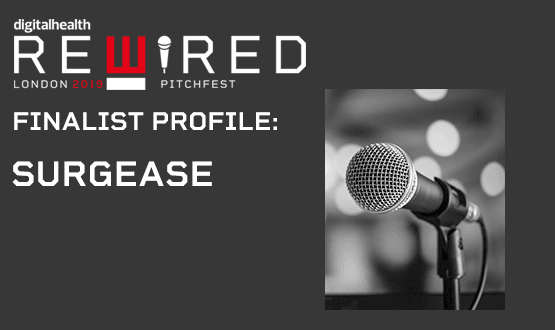Fareed Iqbal’s frustrations when working as an NHS surgeon were the inspiration behind point of care cancer diagnostic device SurgEase – one of our Digital Health Rewired Pitchfest 2019 finalists. He explains more about his innovation and how he found taking part in the competition.
Tell us about your innovation and what it does.
Our mission is to improve the accuracy, efficiency and dignity of anorectal assessment. Having an anorectal symptom or disease is embarrassing, distressing and it can be marker of a more serious disease. Reaching an accurate diagnosis is inefficient, requires multiple hospital visits and adds to patient inconvenience and anxiety. Healthcare workers have limited resources at point of care to facilitate decision making.
We are creating an end-to-end solution that connects healthcare teams, empowers patients, streamlines care pathways and reduces the cost of healthcare delivery for anorectal disease.
What gave you the idea for your product?
Having worked in the NHS as a surgeon for over 10 years, the idea was born out of the frustrations of not being able to share visualisation data with the patient or other clinical teams, witnessing an over-reliance on endoscopy services and being left frustrated with the appropriateness of referrals from primary care.
How have you got to where you are now?
The journey started with an early team of engineers, with me initially providing a consultancy role. I never considered myself to be an entrepreneur and I certainly didn’t envisage running a company.
After a year of stagnation and failing to secure any funding from the main government organisations, it became clear that I had to dedicate myself to this venture full time. The NHS Clinical Entrepreneur programme provided me with the confidence to make this jump and after a change in my personal circumstances, I was able to take a year out of clinical practice.
In the last year, we have managed to raise half a million pounds in private equity funding, we have put together a competent and engaged team and we are on track to launch our first product this year.
Why did you decide to enter the health start-up space?
It’s all I know so the decision was easy.
Have you faced any barriers?
Absolutely. We have learnt more from these barriers compared to when things have gone smoothly (which rarely happens!)
We have been a little disappointed with the appetite in the UK for truly disruptive healthcare innovations. The NHS is a challenging system to sell into and it is not currently prepared to adopt innovations at scale. However, things are changing at policy level and only time will tell whether these efforts will change attitudes at ground level.
Why did you decide to enter the Digital Health Rewired Pitchfest?
We felt the audience and exposure would be very useful. It’s always nice to learn about other innovations, learn from fellow entrepreneurs and companies, and to see how your innovation is viewed though the eyes of those who make buying or funding decisions. The event provided this and we felt being involved was an excellent opportunity.
How did you find the experience?
We thoroughly enjoyed the event. We came runners-up and lost to a great company that has a product and is already selling, so that success provided a much needed morale boost. It also crystalised our thinking and we were able to use the feedback to adapt our strategy.
Looking to the future, what do you hope your product will achieve and what’s the next step in achieving that goal?
We hope to, and we are confident that we can, demonstrate an immediate benefit of our innovation in clinical practice. We aim to launch this year, and our next big pivot is securing CE marking this summer. We can then pilot our innovation with real life patients and start gathering early data on the value proposition of our innovation.
What advice would you give to someone looking to enter the health start-up space?
It is an extremely rewarding and ‘hot’ sector to enter at the moment with a great deal of innovation being developed.
However, I would strongly recommend that any budding entrepreneur wishing to enter the sector questions their idea every day, to make sure it is novel and worth doing; builds a team of people who have similar ambitions; and learns how to raise money – and then does so.
You also have to be prepared for unreasonable barriers, prepare your loved ones for the journey (your work certainly will affect your family), and expect failure and become good at predicting it.
But if you keep the patient at the centre of your vision, building something that truly helps them, then you will succeed. They are your true end customer – not the NHS, the distributor or your investor.
The Digital Health Rewired Pitchfest competition gives innovators from across health and social care the chance to pitch their idea to sector leaders. Over 70 start-ups applied to take part in the 2019 event, sponsored by Silver Buck, with the final taking place at Digital Health Rewired on 26 March.
Want to pitch your start-up or idea to NHS IT leaders and investors? Entries for Rewired Pitchfest 2020 are now open; you can apply here.

